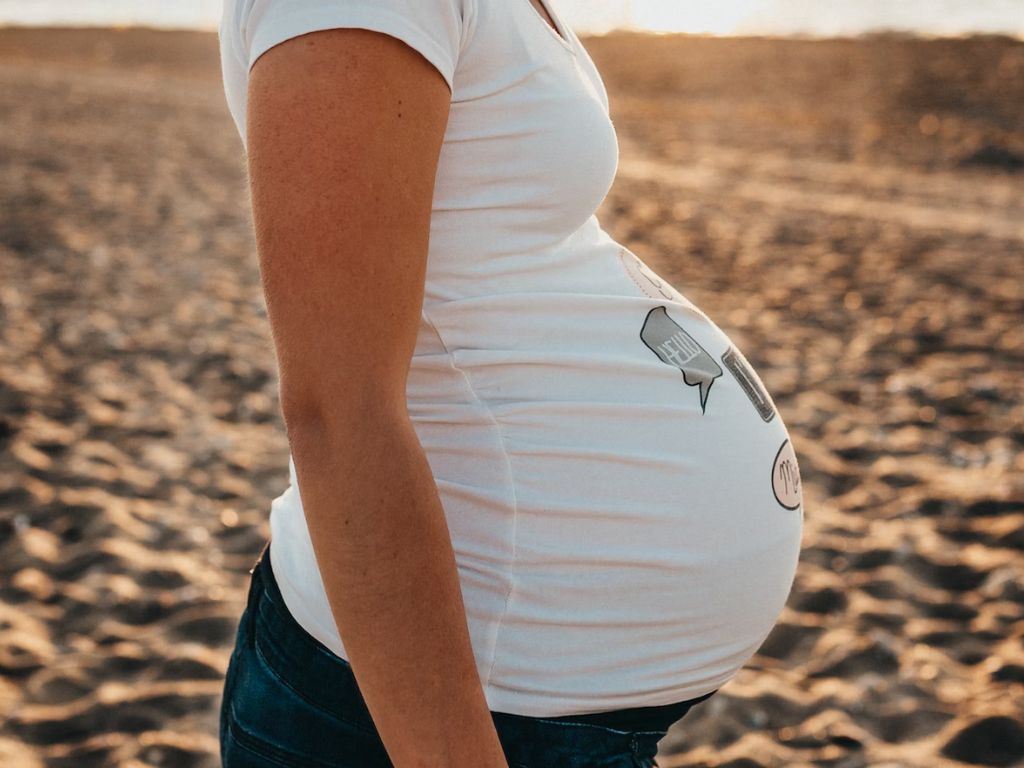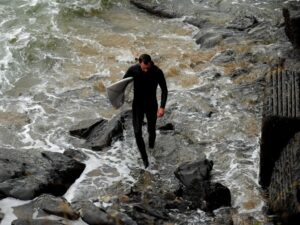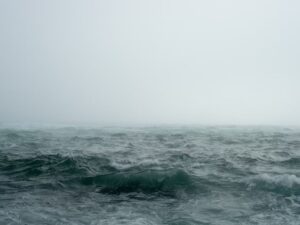Honestly, expecting mothers unnecessarily get a bad reputation. I think the husbands are the real worry-warts. Don’t do this, don’t do that. Don’t go into the ocean, it’ll hurt the baby!
It is undeniable that moms-to-be must take the necessary precautions to ensure their kid’s safety. But can swimming or surfing be that dangerous? Can the motion of the waves really cause a miscarriage?
Obviously, you and I aren’t asking for Alley-Oops or reverse flips in a stormy sea. We all understand that safety is the top priority. With that in mind, what’s the verdict?
No scientific evidence suggests that ocean waves can cause a miscarriage or harm the baby in your belly. Generally speaking, mild ocean waves are safe during pregnancy. In fact, some doctors may even suggest water therapy for expecting mothers dealing with body pain, mental stress, etc.
That said, physical trauma or undue stress, in general, could pose risks during pregnancy.
Dr. Ahmed M. Al-Malt, a Florida-based specialist in maternal-fetal medicine, advises, “Every pregnancy is unique. What’s safe for one person might not be for another. Always consult with your healthcare provider before making any decisions.”
Still don’t believe me? Let’s help you figure out when to swim and how to stay safe out there.
Is swimming in the ocean okay in early pregnancy?
Absolutely!
During early pregnancy, swimming in the ocean and spending time at the beach is not just permissible but also beneficial in a controlled environment. The gentle ebb and flow of the sea can offer therapeutic advantages to the expecting mother.
If you have enjoyed the ocean and beach before your pregnancy, you will love it even more. The ocean can easily become your escape, offering a sanctuary of calm and tranquillity in a rather draining period of your life.
And that’s just when you’re sitting in the sand. Things take a turn for the better when you jump into the ocean.
Swimming is a delightful, low-impact exercise that alleviates common pregnancy discomforts like backaches and foot swelling. The buoyancy of the water takes off the extra weight, making your body feel lighter and offering relief to those hard-working joints.
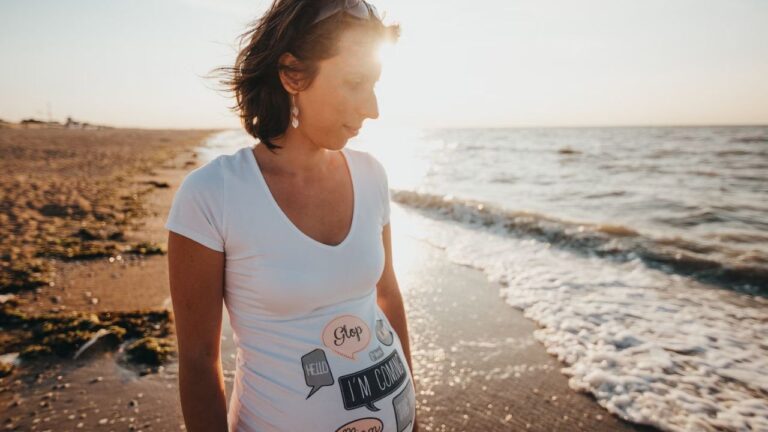
Surfing, while maybe a tad ambitious for some, helps enhance muscle tone and keeps the cardiovascular system in check. All of this while basking in the beauty of the azure sea.
Don’t believe me? Here, I recently wrote an in-depth article on this very topic.
Ever heard of the term ‘water therapy’? It’s almost like the ocean is nature’s spa for expecting moms.
A water therapy session generally includes multiple exercises done in water. It eases muscle tension and is known for its calming mental effects. I suggest you talk to your OB-GYN so they can help you try this amazing exercise.
Okay, enough praise. While the ocean is GREAT for its therapeutic properties, caution is essential too. After all, there’s a reason you got worried and came to this article.
Why should you be careful in the ocean?
A study published in the Journal of Obstetrics and Gynecology highlighted the potential dangers of waterborne infections during pregnancy.
The research indicated that exposure to certain pathogens in ocean water, especially if ingested, could lead to complications.
1. Physical Injury
A powerful wave can easily knock you off balance even when you’re at your 100%. For expecting mothers, the risk is intensified.
The growing belly will affect your center of gravity, making it easier to lose balance and fall painfully.
A sudden tumble or being thrown against the sand can result in injuries, not just to the mother but potentially to the unborn child.
2. Cold Water Plunge
We all love that instant cooling sensation when we plunge, right? But suddenly, immersing yourself in cold water during pregnancy can shock the system.
It may lead to hyperventilation, a rapid decrease in body temperature, and, in severe cases, hypothermia. Such abrupt changes can elevate stress levels, which isn’t ideal for the baby.

3. Physical and Mental Fatigue
The ocean is unpredictable. Even the most seasoned swimmers can find themselves caught in a difficult wave.
For a pregnant woman, the physical strain of battling these currents can lead to exhaustion, dehydration, or even strain on the heart.
4. Contaminated Water
Sometimes, we inadvertently swallow a bit of seawater during our swims. But do you know what’s in that gulp?
Coastal waters can occasionally be contaminated with harmful chemicals, pollutants, or sewage. Consuming such water might lead to gastrointestinal illnesses, indirectly impacting your baby’s health.
Moreover, waterborne pathogens can cause infections, especially if you have an open wound. Such infections might require medication, which could have implications for fetal health.
5. Harmful Marine Life
The ocean is filled to the brim (quite literally) with marine life. And not all of them are friendly.
There are creatures like jellyfish, sea urchins, or even some types of fish that can sting or bite. A run-in with one of these can lead to painful stings, allergic reactions, or infections.
Being aware of your surroundings and informed about the marine life in the area you’re visiting can help prevent such encounters.
How to swim safely during pregnancy?
Here are 7 tips and tricks to help you swim safely during pregnancy.
1. Start with Proper Posture.
Good posture isn’t just for yoga. It’s important in swimming, too. Ensure that your back is straight and you’re not arching it excessively.
You might feel slightly off-balance as your center of gravity shifts with the baby bump, but it’s the right thing to do.
2. Choose Calm Waters.
The sea’s beauty can sometimes be deceptive. It’s best to avoid swimming during rough seas or in areas known for strong currents.
Look for signals or warnings on the beach, and if in doubt, ask the lifeguard about the day’s conditions.
3. Stick to Shallow Areas.
While you might be an expert swimmer, staying within shallow waters is recommended during pregnancy. This doesn’t mean you can’t enjoy a good swim; just ensure you’re in a depth where you can comfortably stand.
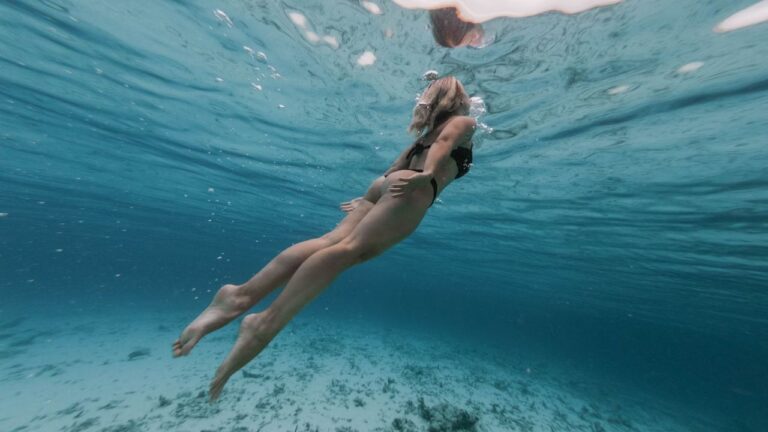
4. Know Your Physical Limits.
Pregnancy isn’t the time to test your endurance in the water.
You must consider your physical limits and not push yourself too hard. Listen to your body and take a break if you feel tired or out of breath.
5. Stay Hydrated and Protected.
The combination of sun and salt can be dehydrating. Always keep a bottle of water handy and take regular sips.
Moreover, even if you adore that sun-kissed glow, apply good-quality sunscreen to protect your skin from harmful UV rays.
6. Prioritize Water Hygiene.
I know how pristine the ocean sometimes seems, but it’s not. And you shouldn’t take any chances. Avoid areas near outlets or where the water seems stagnant. Always shower after a swim or surf session to eliminate the contaminants.
7. Always Have a Companion.
Whether it’s your partner, a friend, or a family member, having someone by your side is always safer when swimming during pregnancy. They can offer assistance if needed and make the experience more enjoyable.
Expert QnA
Q. Can cold water immersion affect pregnancy?
Generally, cold water immersion could be (unintentionally) harmful to pregnant women. During this therapy, the decrease in body temperature can lead to cold shock. This sudden change can cause the body to undergo stress, potentially reducing blood flow to the fetus.
While occasional brief exposures might not pose significant risks, prolonged immersion in cold water is not recommended during pregnancy.
Q. Can swimming cause miscarriage in early pregnancy?
While swimming is generally considered a safe and low-impact exercise, it’s crucial to swim in safe and hygienic environments to avoid infections. You should also avoid activities that could lead to physical trauma, like diving from heights or swimming in rough seas.

